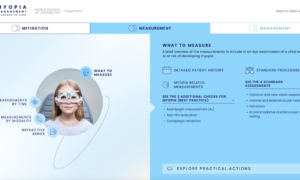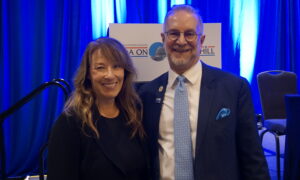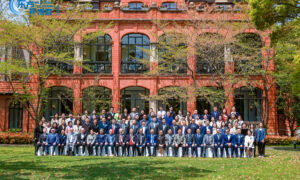October 16, 2023
By Gina Wesley, OD, MS, FAAO
As a clinician, and a myopia researcher, I feel it is my duty to ensure my patients and their parents are educated about myopia. We’ve found that easy, repetitive information in digestible blocks is most effective at getting parents to understand what we’re trying to do with myopia management.
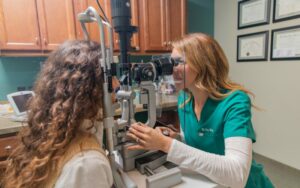 I was first introduced to myopia management in optometry school at The Ohio State University. As I entered practice, I saw a need and an opportunity to offer these treatments to my patients. I’ve been practicing for 16 years and started my practice — Complete Eye Care of Medina — cold 15 years ago. During that time, I’ve practiced and done clinical research, as well as consulted in the eye care field.
I was first introduced to myopia management in optometry school at The Ohio State University. As I entered practice, I saw a need and an opportunity to offer these treatments to my patients. I’ve been practicing for 16 years and started my practice — Complete Eye Care of Medina — cold 15 years ago. During that time, I’ve practiced and done clinical research, as well as consulted in the eye care field.
After my time in optometry school and seeing the need for myopia management services for my patients, I knew it was time to get serious about learning more about the specialty. I sought out continuing education and resources to train and update my knowledge on juvenile-onset myopia and the latest treatments. I also attended specific conferences emphasizing myopia management education.
Getting Specific with Each Patient
Orthokeratology was the first myopia management treatment option I started offering my patients, and I immediately saw success with it. Currently, it’s the treatment I prescribe the most for my myopia patients, as we continue to see great results and my patients are compliant with the treatment. I’ve found that OrthoK is a convenient way to correct vision for most of my patients, as their day-to-day routines remain unchanged. My patients gravitate towards this option because they feel freedom from not having to wear glasses or contacts during the day. Whether they participate in sports or after-school activities or need to study, their vision isn’t something they ever have to think about. It’s also a relief for parents because they don’t have to worry about their child breaking their glasses or losing their contacts or anything that could possibly go wrong and hinder their child’s vision.
However, not every patient is the ideal candidate for OrthoK — or for every myopia management treatment that’s currently available. It’s important for practitioners to have a wide variety of options as each patient is different and has different comfort levels with each of the therapies. So, in addition to OrthoK, we also offer patients soft multifocal contact lenses and low-dose atropine. Prior to the FDA approval for CooperVision’s MiSight 1 day contact lenses for myopia progression control, I was using a variety of different contact lens brands off-label for my myopia patients. Now, I usually prescribe the FDA-approved option, as this tends to be an easier conversation with parents.
Ultimately, it all comes down to the patient who is in my chair. Just because I see a lot of success with OrthoK, doesn’t mean that OrthoK is necessarily the best option for each patient. I look at the patient’s age and medical history, and I try to learn as much as I can about them and their lifestyle to choose the treatment that’s right for them. That information, coupled with what’s proven to be most effective based on clinical research, is how I come up with myopia management treatment plans. I also will always consider combination treatments if that’s what’s best for the patient.
Creating Awareness with Patients and Parents
In my practice, I’ve found that candid conversations in the exam lane about myopia, the related risks, and the available treatments, work best. This goes for when myopia is either first detected or is already present. Sometimes, information must be presented several times over several visits for the parents to opt in. Most are grateful to have the option, even if they choose not to pursue it initially — or at all.
As a clinician, and a myopia researcher, I feel it is my duty to ensure my patients and their parents are educated about myopia. To that end, we’ve created QR codes that are posted all around the office that provide parents easy access to our myopia management frequently asked questions page and additional educational information. I also regularly update our practice website and our social media channels so all the information is available across several different platforms — patients and parents can access it in any way they prefer. We’ve found that easy, repetitive information in digestible blocks is most effective at getting parents to understand what we’re trying to do with myopia management and also get them on board. Social media in particular serves as a reinforcer of information and a positive place to post proven stories.
A general lack of awareness about myopia and myopia management has been the greatest challenge for us. We take the time to educate patients, one at a time, again and again. From a clinical perspective, I often tell parents that we’re protecting their child’s vision for years to come. While I never want to scare parents, I do want them to know that we’re choosing a myopia management treatment to prevent some of the long-term risks that are associated with untreated myopia.
Embracing Myopia Management
In addition to my practice, I also serve as a consultant for several different companies, which keeps me up to date on the latest technologies in the field. Because I invest heavily in new technologies, this drives forward-thinking patients to my practice, who are more likely to embrace therapies like myopia management. As a practitioner, this exposure gives our clinic tremendous experience and knowledge upon which to build.
Looking to the future, I think this field is growing with even more options for treatment, and I hope the growth continues to allow us to help more patients and prevent more diseases related to myopia.
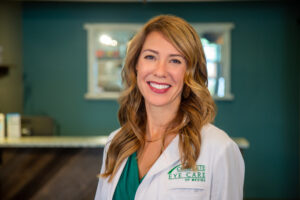 |
Dr. Wesley attended The Ohio State University, where she pursued concurrent degrees in both Clinical Optometry and Masters in Vision Science. Accolades for Dr. Wesley include: The Ohio State University College of Optometry Graduate of the Year and Fellowship within the American Academy of Optometry. She was also awarded Minnesota’s Young Optometrist of the Year for 2011 and the Early Professional Achievement Award in 2013 from Ohio State. She is a member of the Minnesota and American Optometric Associations. Dr. Wesley lectures, advises, conducts research, publishes on many aspects of the optometric industry, and has regular TV appearances discussing public health aspects of vision care. She enjoys all facets of primary care practice, including refractive surgery co-management, contact lenses, children and infant exams, vision therapy, orthokeratology, practice management, and advanced eyewear education. |




